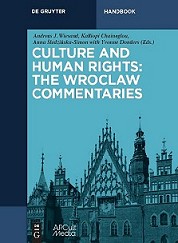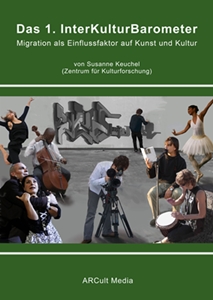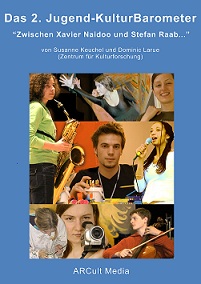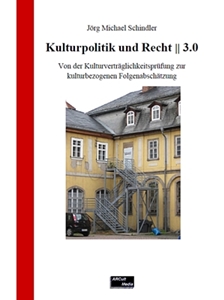Neuheiten

Culture and Human Rights
The Wroclaw Commentaries
Die Stadt Wroclaw (Breslau) hatte, im Rahmen des Programms der Europäischen Kulturhauptstadt Wroclaw 2016, Prof. Dr. Andreas Joh. Wiesand und sein Team bei ARCult Media um die Vorbereitung eines Handwörterbuchs mit dem o.g. Titel gebeten, zu dem Fachleute aus zahlreichen Ländern beitragen sollten. Dieses Handbuch, das erste seiner Art weltweit, ist jetzt in Zusammenarbeit mit dem Verlag de Gruyter, Berlin publiziert worden. In 130 Artikeln umfasst es relevante Rechtsfragen und wichtige politische Konsequenzen zum Thema Menschenrechte und Kultur (im weiteren Sinne), darunter: Kunst- und Meinungsfreiheit; das Recht auf Teilhabe an Kultur, an alten und neuen Medien sowie am Kulturerbe; Fragen religiöser und sprachlicher Rechte; der Schutz kultureller Minderheiten; Sicherung kultureller Vielfalt und weitere Aspekte.
In the context of the programme for Wroclaw - European Capital of Culture 2016, the City of Wroclaw asked Prof Dr. Andreas Joh. Wiesand and his team from ARCult Media to prepare, together with experts from many different countries, a basic handbook with the above title. This concise dictionary, the first of its kind, has now been published in cooperation with the international publishing house de Gruyter, Berlin/Boston. In 130 articles, it covers relevant legal questions as well as political consequences related to human rights and culture in the wider sense, including: freedom of, and access to, the arts, (old/new) media and heritage; questions of religious and language rights; the protection of minorities; safeguarding cultural diversity; and other issues.
ISBN 978-3-11-044050-8, 360 Seiten/pages, Hardcover, € 99.95

Das 1. InterKulturBarometer
NEUERSCHEINUNG 11/2012!
Das 1. Inter-KulturBarometer schließt eine Lücke in der empirischen Grundlagenforschung zu Prozessen der kulturellen Identitätsfindung in einer zunehmend durch Migration geprägten Gesellschaft. Gestützt auf eine repräsentative Bevölkerungsumfrage (2800 Interviews, 60 qualitative Gespräche) untersuchen Susanne Keuchel und weitere Fachleute systematisch Einflüsse des Faktors Migration auf Kunst und Kultur in Deutschland. Dabei werden mögliche Brückenfunktionen der Künste, Gestaltungspotenziale der Kulturpolitik und optimierte Prozesse der Kulturellen Bildung herausgearbeitet, die der neuen Vielfalt in unserer Gesellschaft besser gerecht werden könnten.
Cultural Participation of Migrants: In order to investigate how migration influences cultural life in the hosting countries, in particular cultural participation and artistic-creative processes, a first "InterCultureBarometer" survey was conducted by the Centre for Cultural Research (ZfKf) in Germany. It points to a "bridging" role of the arts, to potential cultural policy action and to needed improvements in arts education. The study (with an English summary) could become a model for similar research efforts in the domains of cultural participation and intercultural dialogue in other European countries.
ISBN 978-3-930395-89-7, 220 S., € 25.00

Das 2. Jugend-KulturBarometer
Zwischen Xavier Naidoo und Stefan Raab...
"Kulturverträglichkeitsprüfungen" führten in der EU und in Deutschland zu großen, bisher aber nicht eingelösten kulturpolitische Erwartungen. Die Studie Kulturpolitik und Recht 3.0 von Jörg Michael Schindler belegt, dass es hier weniger an politischem Willen und eher an juristisch schlüssigen und praktisch umsetzbaren Konzepten mangelte. Sie klärt zunächst die wichtigsten Probleme in der EU und in Deutschland, geht aber darüber hinaus: Mit Blick auf veränderte politische Rahmenbedingungen wird ein neues, unmittelbar einsetzbares Modell entwickelt, die "kulturbezogene Folgenabschätzung", die Verantwortliche in Politik, Verwaltung, Wissenschaft, Kultur und Medien zum Handeln motivieren sollte.
En Route to Culture-Related Impact Assessments? In his book, legal expert Jörg Michael Schindler (Munich) refers inter alia to the now widespread practice of "Regulatory Impact Analyses" (OECD) and “Integrated Impact Assessments” (EU) for environmental, economic and social concerns. In his view, this type of evaluation could help to overcome the current ineffectiveness of the so-called "Cultural Awareness Clause" (Art. 167.4 TFEU) of the EU. Since systematic culture-related assessments are still more an exception than a rule, the author has elaborated the model of a ‘Culture-Related Impact Assessment’ process (CRIA). CRIA could easily be implemented on the basis of existing administrative instruments. An English summary of the Book is available here.
ISBN 978-3-930395-88-0, 212 S., € 25.00

Kulturpolitik und Recht 3.0
NEUERSCHEINUNG 8/2011
"Kulturverträglichkeitsprüfungen" führten in der EU und in Deutschland zu großen, bisher aber nicht eingelösten kulturpolitische Erwartungen. Die Studie Kulturpolitik und Recht 3.0 von Jörg Michael Schindler belegt, dass es hier weniger an politischem Willen und eher an juristisch schlüssigen und praktisch umsetzbaren Konzepten mangelte. Sie klärt zunächst die wichtigsten Probleme in der EU und in Deutschland, geht aber darüber hinaus: Mit Blick auf veränderte politische Rahmenbedingungen wird ein neues, unmittelbar einsetzbares Modell entwickelt, die "kulturbezogene Folgenabschätzung", die Verantwortliche in Politik, Verwaltung, Wissenschaft, Kultur und Medien zum Handeln motivieren sollte.ISBN 978-3-930395-87-3, 268 S., € 35.00

